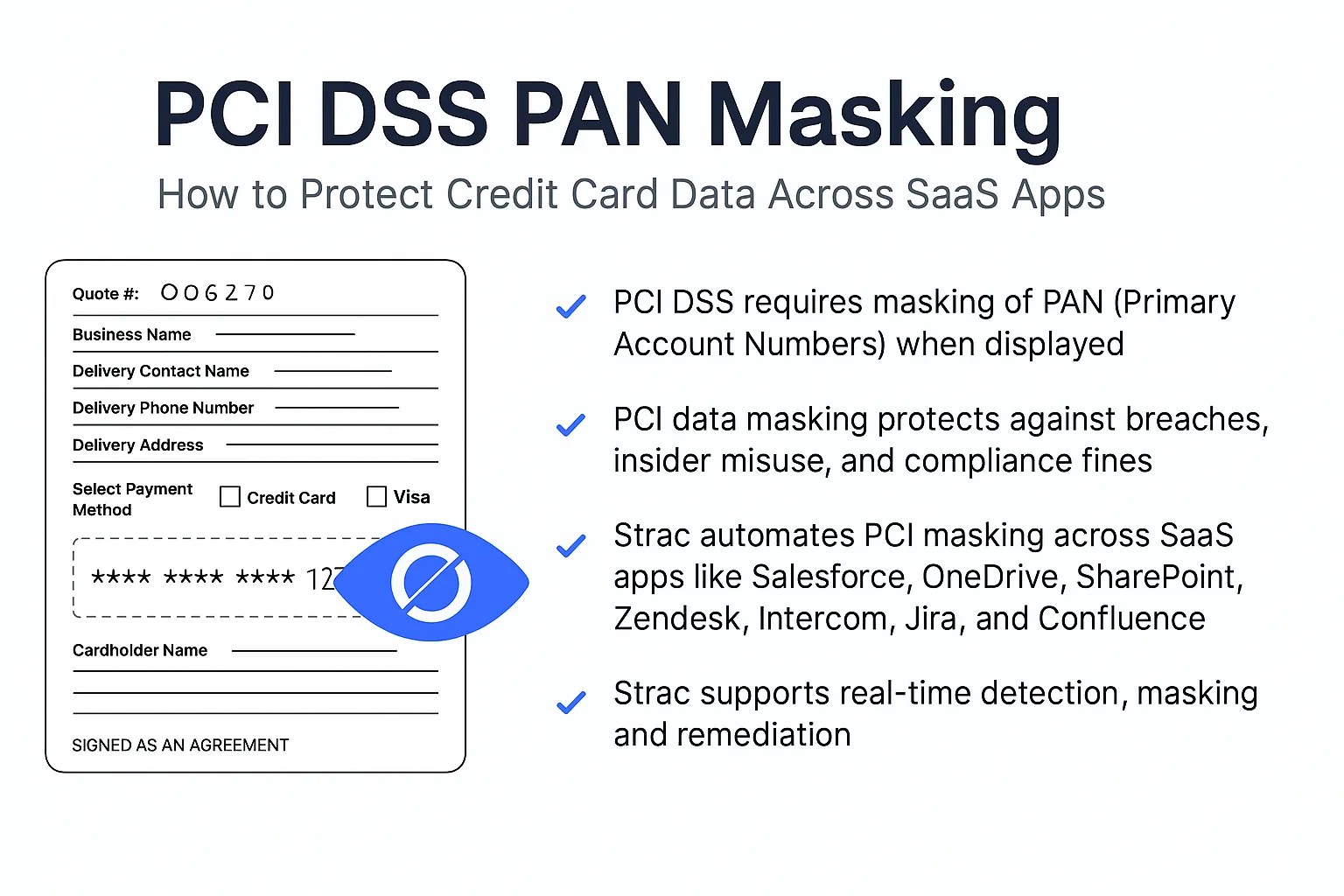TL;DR:
- Implementing a DLP solution for Zoho Desk is crucial for protecting sensitive information and ensuring compliance with regulations.
- Strac's Zoho Desk DLP automatically discovers, scans, classifies, and remediates sensitive data to keep your customer support platform secure.
- Features include redacting sensitive information, adhering to regulatory standards, utilizing advanced data discovery and classification, and implementing comprehensive remediation measures.
- Strac's solution also protects unstructured data and various types of attachments, ensuring all aspects of your Zoho Desk instance are secure.
- By choosing Strac as your DLP solution, you can rest assured that your organization's sensitive information is in safe hands.
Why One Needs a DLP Solution for Zoho Desk?
In today's digital age, protecting sensitive information is more critical than ever. As businesses increasingly rely on customer support platforms like Zoho Desk to manage customer inquiries, the potential for sensitive data exposure grows. Data Loss Prevention (DLP) solutions are essential for safeguarding this information and ensuring compliance with various regulations.
Illustration 1: Enhancing Security for Personally Identifiable Information (PII)
Imagine a customer submits a ticket to Zoho Desk containing their full name, address, and social security number. Without a DLP solution, this sensitive information could be exposed to unauthorized personnel, leading to potential identity theft and legal repercussions.
Illustration 2: Ensuring Protection for Payment Card Information (PCI)
A customer might include their credit card details in a ticket, unaware of the risks. If this data is not adequately protected, it could result in financial fraud and significant harm to both the customer and the company.
Illustration 3: Safeguarding Health Information Privacy (PHI)
For companies in the healthcare sector, handling tickets containing Protected Health Information (PHI) is a common occurrence. A ticket might include a patient's medical history or insurance information. Failing to protect this data could lead to severe HIPAA violations and damage to the company's reputation.
Given these scenarios, a robust DLP solution is crucial for any organization using Zoho Desk. It helps prevent unauthorized access to sensitive information, ensures compliance with regulatory requirements, and protects the company's reputation.
Understanding the Functions of Strac Zoho DLP
Strac, a leader in Data Discovery and Data Loss Prevention (DLP), offers a comprehensive solution for Zoho Desk. Strac's Zoho Desk DLP is designed to automatically discover, scan, classify, and remediate sensitive data, ensuring your customer support platform remains secure and compliant.
Redacting Sensitive Comments in Tickets
One of the key features of Strac's Zoho Desk DLP is its ability to redact sensitive information from comments in tickets. Whether it's Personally Identifiable Information (PII), Payment Card Information (PCI), or Protected Health Information (PHI), Strac's solution ensures that sensitive data is automatically identified and redacted before it can be accessed by unauthorized personnel. This includes unstructured text and various types of attachments such as PDFs, JPEGs, PNGs, screenshots, DOCX, and XLSX files.
Adhering to Regulatory Standards for Compliance
Compliance with regulations such as GDPR, HIPAA, and PCI-DSS is critical for any business handling sensitive information. Strac's Zoho Desk DLP helps ensure that your organization meets these compliance requirements by continuously monitoring and protecting sensitive data. By automatically scanning and redacting sensitive information, Strac minimizes the risk of data breaches and compliance violations.
Utilizing Advanced Data Discovery and Classification Features
Strac's Zoho Desk DLP leverages advanced data discovery and classification techniques to identify sensitive data across your Zoho Desk instance. Using machine learning algorithms, Strac can accurately classify various types of sensitive information, ensuring that no data is overlooked. This comprehensive approach helps maintain the integrity of your data and provides peace of mind that your organization's sensitive information is secure.
Implementing Comprehensive Remediation Measures
Strac offers a range of remediation actions to protect sensitive data within Zoho Desk. In addition to redaction, Strac's solution includes encryption, blocking, alerting, and deletion. These actions ensure that sensitive data is not only identified but also appropriately handled to prevent unauthorized access and data breaches. Strac's flexible remediation options allow organizations to customize their DLP policies based on their specific needs and compliance requirements.
Protecting Unstructured Data and Attachments
Strac's Zoho Desk DLP goes beyond traditional data protection by also securing unstructured data and various types of attachments. This includes images, documents, and other file types that may contain sensitive information. By automatically scanning and redacting sensitive data within these attachments, Strac ensures that all aspects of your Zoho Desk instance are protected.
Exploring the Complete Inventory of Sensitive Data Elements
Strac provides a comprehensive catalog of sensitive data elements that its Zoho Desk DLP solution can identify and protect. This catalog includes a wide range of data types, from basic PII such as names and addresses to more complex information like financial details and medical records. For a full catalog of sensitive data elements, visit Strac's blog.
Final Thoughts
In conclusion, a DLP solution is essential for any organization using Zoho Desk to manage customer support tickets. The potential risks of data breaches and compliance violations make it imperative to have robust data protection measures in place. Strac's Zoho Desk DLP offers a comprehensive solution that automatically discovers, scans, classifies, and remediates sensitive data. With advanced features like redaction, encryption, blocking, alerting, and deletion, Strac ensures that your Zoho Desk instance remains secure and compliant.
By choosing Strac as your DLP solution, you can rest assured that your organization's sensitive information is in safe hands. Strac's commitment to data security and compliance makes it the leader in Data Discovery and Data Loss Prevention, providing peace of mind for businesses of all sizes.
For more information on how Strac can protect your Zoho Desk instance, visit Strac's website.
Sensitive Data Types for Zoho Desk DLP
Checkout all the sensitive data elements and file formats supported by Strac: https://www.strac.io/blog/strac-catalog-of-sensitive-data-elements











.webp)














.webp)




.avif)


